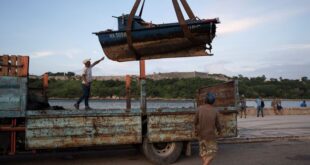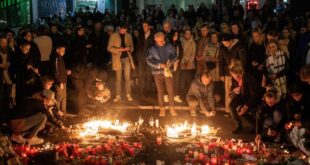PORT-AU-PRINCE (Reuters) – Hundreds of Haitians set up camp around the main square of the capital city on Friday, in a sign of deepening chaos as fresh overnight attacks by armed gangs pushed already displaced people further downtown.
The Gran Ravine gang, led by Renel Destina, has besieged the heavily populated neighborhood of Carrefour Feuilles for weeks, forcing aid workers to withdraw and thousands of people to flee their homes. Under-resourced police have struggled to contain the violence.
“He was 3 years old,” Dailove Pompilus said of her first child, who she says died when the gang attacked her home in Carrefour Feuilles. “They burned down the house with him inside.”
She was forced to flee to Port-au-Prince’s central square while nine months pregnant.
Sophia Jean, another resident, fled with her 8-month-old baby and the clothes on her back. “I did not have time to take anything,” she said.
The United Nations estimates more than 10,000 people have been displaced in the last two weeks alone.
Friday marked the first time since the catastrophic 2010 earthquake that people have camped in the Champ de Mars, the capital’s main square that is home to historical monuments honoring heroes of the Haitian Revolution.
People move there on Thursday night from Place Jeremie, a makeshift camp roughly 1.5 kilometers (1 mile) away.
By Friday, rights group CARDH estimated roughly 100 people were spread around the square, avoiding the afternoon heat, and several hundred more sheltered in nearby schools.
“They shot at us,” said Clerina Coffy, who ran from Place Jeremie with her three children during the night. “We are here because we have nowhere to go with the kids.”
Haiti’s gang warfare has left some 2,500 dead and 1,000 injured since January, according to the U.N., amid widespread kidnappings, lynchings and sexual violence.
The U.N. Security Council is expected to vote on a plan to send international security assistance, which Haiti’s unelected government requested last October. A Kenyan delegation met with police chiefs last month but the controversial force has yet to materialize.
(Reporting by Harold Isaac, Jean Loobentz Cesar and Ralph Tedy Erol in Port-au-Prince and Sarah Morland in Mexico City; Editing by Andy Sullivan)
 BeritaKini.biz Berita Viral Terkini di Malaysia
BeritaKini.biz Berita Viral Terkini di Malaysia





